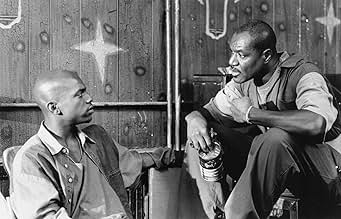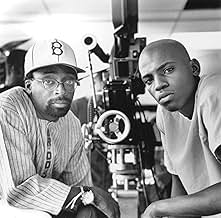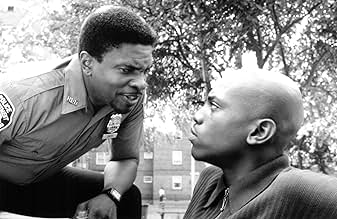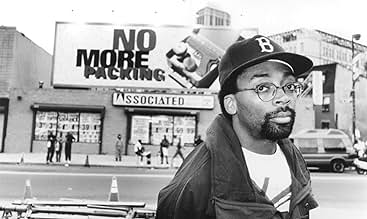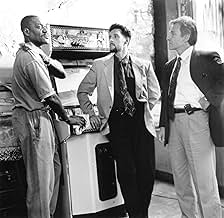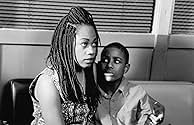Young drug pushers in the projects of Brooklyn live hard dangerous lives, trapped between their drug bosses and the detectives out to stop them.Young drug pushers in the projects of Brooklyn live hard dangerous lives, trapped between their drug bosses and the detectives out to stop them.Young drug pushers in the projects of Brooklyn live hard dangerous lives, trapped between their drug bosses and the detectives out to stop them.
- Awards
- 6 nominations total
- Tyrone
- (as Pee Wee Love)
- Errol Barnes
- (as Tom Byrd)
- Go
- (as Fredro)
- Horace
- (as E.O. Nolasco)
- Sharon
- (as Lisa Arrindell Anderson)
Featured reviews
Lee does not hang around in presenting or perhaps delivering his subject matter as a whole. The thing that amazes me with Lee is that he can write so many different types of characters: low grade African-Americans, educated and seemingly decent African-Americans; white cops; women of different ethnicity and a few others. In Clockers, the opening scene which integrates with the credits is of a somewhat crude and humiliating public autopsy during which a couple of white cops examine a dead black man in front of a watching black crowd. Two of these detectives are Rocco Klein (Keitel) and Larry Mazilli (Turturro) but the scene acts as one final act of humiliation to an already dead black man as they search his carcase for clues and bullet holes.
But the film has more than one current flowing throughout it. Strike (Phifer) plays a neighbourhood African-American who speaks and acts just like all his drug dealing friends, even hanging with them when they act out their drug selling routine to customers in a staged manner. But Strike is different and Lee wants us to create an alternate profile of the man by giving him milkshakes to drinks and trains to collect, set up in his apartment, maintain and run. The others laugh at this hobby but Strike maintains most of them too have hobbies: collecting welfare cheques. But this is the greatness of a character like Strike; we are led to believe he is a bad influence through the dialogue of a police man named Andre the Giant (David) but this is perhaps just another cop's point of view and opinion on another African American kid.
Andre believes Strike to be a bad influence on Tyrone (Love) but what Andre fails to notice is that there are higher, more criminal minds badly influencing Strike and that is more of a problem than Strike talking to Tyrone. The film is about a seemingly nice and somewhat moral 'gangstar' who is put in a situation where murder is the only way out, and we go through the narrative with the emphasis on this moral gangstar that he is actually a cold blooded killer in an excellent and very effective piece of atmosphere. But this is a slow burner and it slowly burns away at our opinion because there is a scene in Strike's apartment when he talks to Tyrone all about drugs and guns, apparently Tyrone should stay away from taking drugs but selling them will bring him a nice chunk of change; however guns are something that Tyrone should seriously consider getting into. To top this scene off, Tyrone is told that mathematics is also a very good thing. Already, Lee is trying to manipulate and force us to change out minds as to weather we like Strike. Is he a killer? Does he know drugs should be completely avoided? Why does he suggest Tyrone get a gun one day? Or is it just a misguided fool repeating what he once heard and saying what he thinks is right. Interesting how later on Tyrone repeats train information to another person after sort of adopting a 'Strike' figure.
But the film has some more strong points. Rodney Little (Lindo) thinks that just because he has had a shotgun in the mouth and was manipulated into murder, he can do it to others. Little himself asks Strike "How are you so smart and so stupid?" in a scene that actually has someone echo Strike's personality to his face. Little's background in presented in a nasty and somewhat disturbing fashion via flashback to the days when he was younger with Errol Barnes (Byrd), the resident 'hood psychopath-come-criminal who seems to have some distorted views to do with religion. With all this in the melting plot, it's no wonder the film does a good job in maintain interest and quality delivery. Lee does not fail to focus on his subject matter like he does in Summer of Sam when tackling the psychological development of a serial killer and a love triangle at the same time became messy. Instead, he does not get sidetracked with any unnecessary sub-plots and keeps the delivery sharp, realistic and intriguing when the final act comes to an end.
Clockers has a main plot that pushes along, as the murder by multiple gun-shots of a Darryl, black fast-food worker, who was also apart of the crew of Rodney (Delroy Lindo), call into question who might have done it. At first, it seems pretty open and shut, as Victor (Isaiah Washington) comes forth and admits he did it in self-defense. Rocco Klein (Harvey Keitel) doesn't buy it, seems too easy, so he asks around, digs deeper, and sees that his brother, Strike (Mekhi Pfeifer) seems to be much more of the guilty party, by way of how he handles himself in the streets, his repore with Rodney, and as having more motive to kill Darryl. It's through this that Lee then branches it out to make it as much as character as about plot, where the ties between certain characters, like Strike and Tyrone, a pre-teen who looks up to Strike like a surrogate father, are mostly defined by how the neighborhood works out in the open. The clockers are bunch of would-be gang-bangers who talk a lot of talk, but haven't walked nearly as much as Earle, best friend of Rodney's and psychopathic murder, or Rodney himself, who has that veneer of being like the one you can trust the most- half surrogate father as well and half good cop/bad cop boss- until he gets crossed.
Although Price's material, which comes through with the energy and occasional wit, is noticeable throughout, it's really Spike Lee as director and many of the actors who make this a consistently watchable movie. Lee is never one to be too subtle with the camera, and he has variations with how he deals with the material to make it very observant but also subjective. Early on, for example, we see the clockers making their deals in the park in long-shot, shaky, as if Lee's filming it far away for a reality TV show. But then we also see the 360 degree camera moves as Klein questions Strike. There's many camera moves that are practically trademark Lee shots, especially with the lighting, as Klein questions Tyrone, or when we see a flashback to Victor having to deal with some clockers. It's all very flamboyant and meant to call attention to the material, and aside from a few unneeded music choices (it's the only time you'll hear Seal in a drug dealer crime movie), he's on top of things. Meanwhile, the performances are all top-notch, usually, as Keitel and particularly Lindo play their characters so well by pretty much being how we think the actors 'really' are, even though they're not. Pfeifer has a little trickier a time with his performance, because he usually is on a very similar note: I didn't do nothing, is his usual beat. His character also has the intriguing qualities that mark him as something of an outsider however in he might be: his stomach virus, which is never resolved but always looming over him, and his love of electric train-sets.
And all the while, Clockers succeeds in presenting a time and place where there should be little to no hope, and it makes the cops and criminals both pretty well-rounded when compared to other genre films. The cops are meant to be the good guys, but there's also a steady conflict between Klein and his partner: why should Klein care so much as to who did it or why (Strike also asks this question towards the end, in one of the best scenes in the film)? And Strike and Rodney are not cut-outs from black exploitation flicks, but with more of a push and pull tie that is always a threat, never a comfort. There are little details that help make Lee's film interesting when it veers into being like a television serial; the white yuppies who get entangled in the case; the over-protective but very smart cop (Keith David, always a pro) who also tries to play surrogate father to Tyrone, albeit without the same care, however negative, as Strike has; the brief shots of the drug addicts with their habits on display, as we only need to see it for less than a minute to get the nature of the bottom of the food chain, which is total despair. Lee's film, however, isn't really disparaging as it has moments of hope, yet a hope meant to be in understanding that there's no easy way out of all of this.
It is not an easy film. It is bleak and at times very off-putting. Actually, if you are a thinking, caring person, this is movie is overall heart-breaking.
But it is brilliant and, for the person who truly tries to understand it, a compelling, insightful look at the problems killing black America today. The only reason for the film's lack of recognition I can imagine is that its subject matter had been examined a number of times before. But the inescapable fact is that this one of the best examinations of the subject matter there has been on screen - on par with "Boyz N The Hood".
And it is FAR from uncreative. In fact, on one level, it is not a "hood" movie, but a whodunit. The mystery aspect of the plot is very interesting. But there are other, more important layers. It is the story of the confusion and crisis of a young man's life. Most importantly, it is a brutal look at drugs, guns, and life in the projects. It is a movie asking why so many young black men are dying in the streets.
The lead character Strike has a stomach problem. It might be an ulcer or something like that. I believe it is a metaphor. Just as heat represented racial tension in Lee's masterpiece "Do The Right Thing", Strike's sickness represents the illnesses plaguing the ghetto: drugs, guns, liquor.
Like DTRT, this film looks at community. The mothers, the cops, the young people, the kids, the men trying to make a living - there is eloquent commentary in "Clockers" on the situations of all. In Spike's movies, paying a little attention is rewarding. A good essay could be written on what I call the Spike Summarization technique. This is when Spike compresses a serious debate or concern in the black community into a few expressive moments of action or dialogue. There are better examples in other movies, but it manifests in "Clockers" a few times. A bunch of kids are sitting in front of Rodney's (Delroy Lindo) shop; one of the kids is rapping while the others pay attention. The two sides to the coin: we feel the artistry and skill of the moment, the continuation of a rich tradition of oral art; we're also struck by the cruelty and coldness in the kid's violent lyrics, and we think about where that comes from.
Stylistically, this movie is a huge success. The cinematography is amazing, and I wonder what must be wrong with my tastes when I'm floored by a film like this and find visually bland a more oft-praised classic. The projects become blinding panoramas, landscapes which add tons of meaning to the poignant ending (I won't reveal it here). The sound is great; many films of this nature use hip hop in the soundtrack to produce certain effects, but "Clockers" does it in a more methodical way which jars some people, but contributes to the film's meaning.
I could say more about the film, but I encourage you to just see it, along with the rest of Spike's oeuvre. He's not a perfect filmmaker, and some of his best films are marred by elements that don't work, but I feel his consistency in terms of delivering brilliance is not below most of the cinema's most celebrated auteurs.
Did you know
- TriviaWas originally supposed to be directed by Martin Scorsese. Rocco Klein would have been the main character, played by Robert De Niro. Scorsese changed his mind, opting instead to direct Casino (1995), and De Niro went with him. Scorsese then asked Spike Lee if he wanted to direct. Lee accepted (and decided that Strike, not Rocco, would be the primary character), and Scorsese was given an "Executive Producer" credit.
- GoofsWhen Detective Mazilli is walking up to the back of the Mercedes Benz to talk to the kids inside his badge/shield is that of an NYPD Detective. However when he shows it to the driver of the car it is the shield of a NYPD Sergeant.
- Quotes
Rodney: If God created anything better than crack cocaine, he kept that shit for hisself. I mean, that shit is like truth serum. It will truly expose who you are. I mean, you happen to be a low-life rat bastard motherfucker, who will sell off his newborn for a suck off that glass dick, crack will bring it right on in the light. Now, I don't care you black, white, Chinese, rich, poor. You take that first hit, you on a mission. And that mission will never end. Even when the house, the money, loved ones are gone, they send you to the joint, you still gonna try to cop.
Ronald 'Strike' Dunham: No doubt.
Rodney: Only time it ends, Strike, that mission, when you six feet under.
- ConnectionsFeatured in Crooklyn Dodgers: Return of the Crooklyn Dodgers (1995)
- How long is Clockers?Powered by Alexa
Details
- Release date
- Country of origin
- Language
- Also known as
- Clockers: Hermanos de sangre
- Filming locations
- Production companies
- See more company credits at IMDbPro
Box office
- Budget
- $25,000,000 (estimated)
- Gross US & Canada
- $13,071,518
- Opening weekend US & Canada
- $4,463,560
- Sep 17, 1995
- Gross worldwide
- $13,071,518
- Runtime2 hours 8 minutes
- Color
- Sound mix
- Aspect ratio
- 1.85 : 1
Contribute to this page



